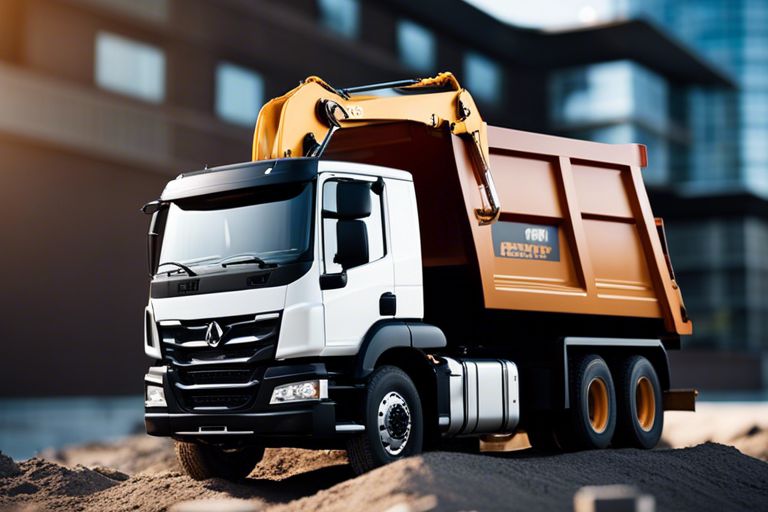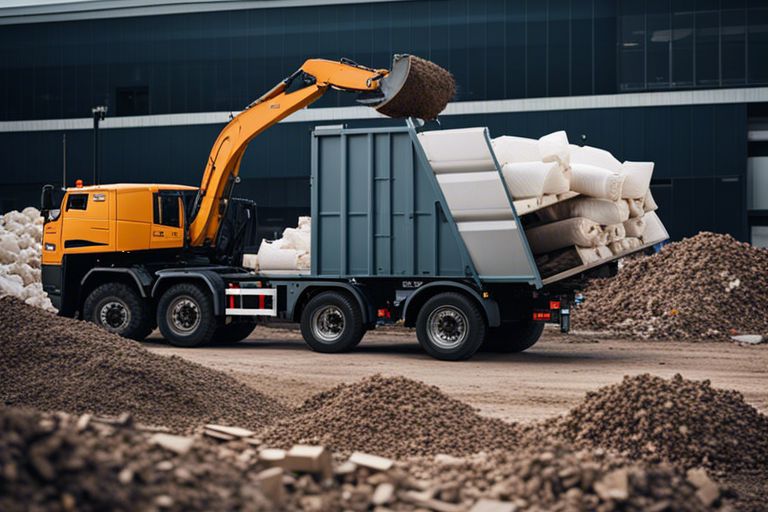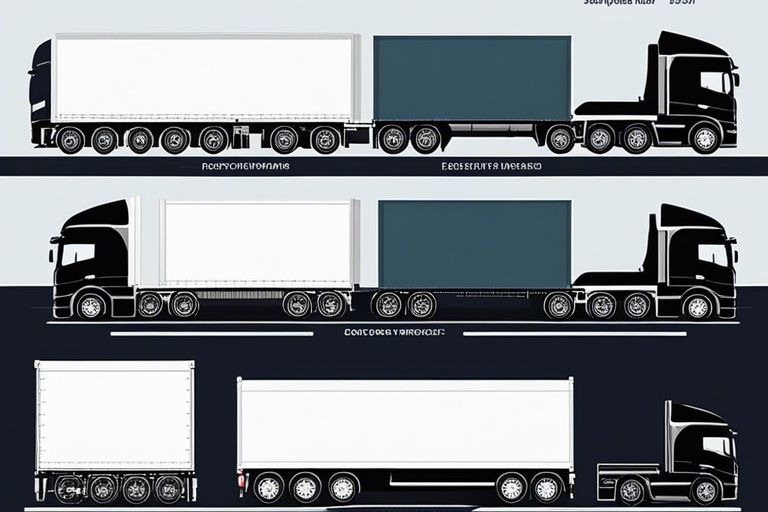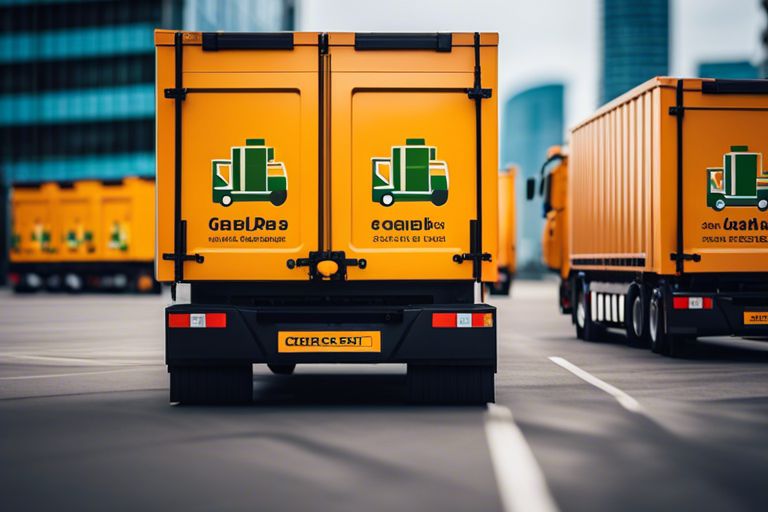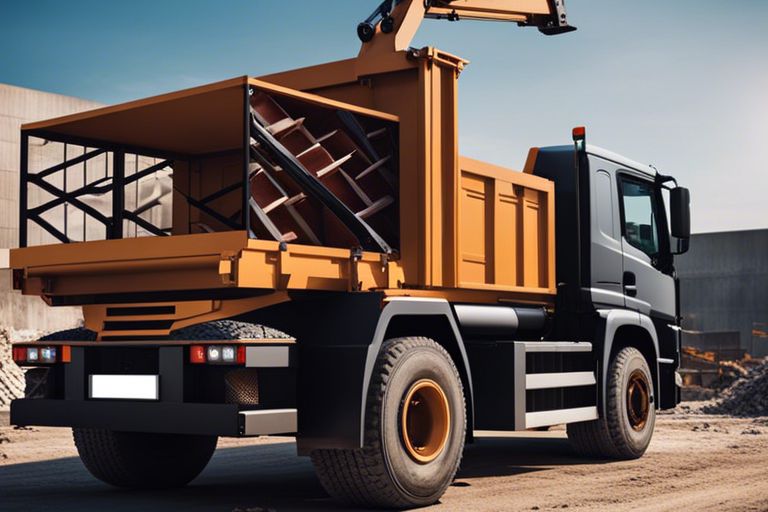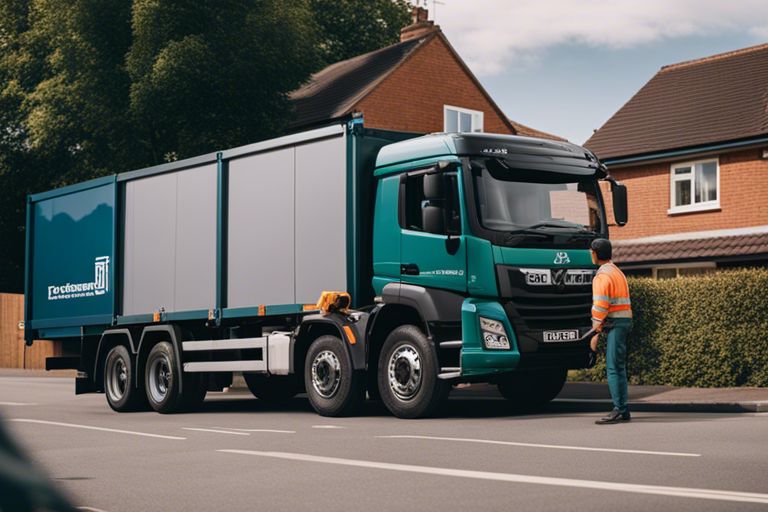Obtaining a waste carrier license is an essential requirement for anyone involved in the transportation, collection, or disposal of waste material. The illegal dumping of waste is a significant environmental problem that can lead to heavy fines and even imprisonment. This blog post aims to provide you with important information about waste carrier licenses, including the application process, legal requirements, and the consequences of operating without a license. Understanding the strict regulations surrounding waste management is crucial for businesses and individuals to avoid legal repercussions and protect the environment. Additionally, we will highlight the positive impact of responsible waste management practices and how obtaining a waste carrier license can contribute to a cleaner and healthier community. Stay informed and compliant to ensure your role in waste management is both legal and sustainable.
Key Takeaways:
- Legal Requirement: Waste carrier licenses are a legal requirement in the UK for anyone transporting waste as part of their business or on behalf of others.
- Types of Licenses: There are different types of waste carrier licenses, including lower-tier, upper-tier, and broker licenses, each with specific requirements and responsibilities.
- Enforcement and Penalties: The Environment Agency enforces waste carrier licensing regulations and has the authority to issue penalties, including fines and imprisonment, for operating without a valid license.
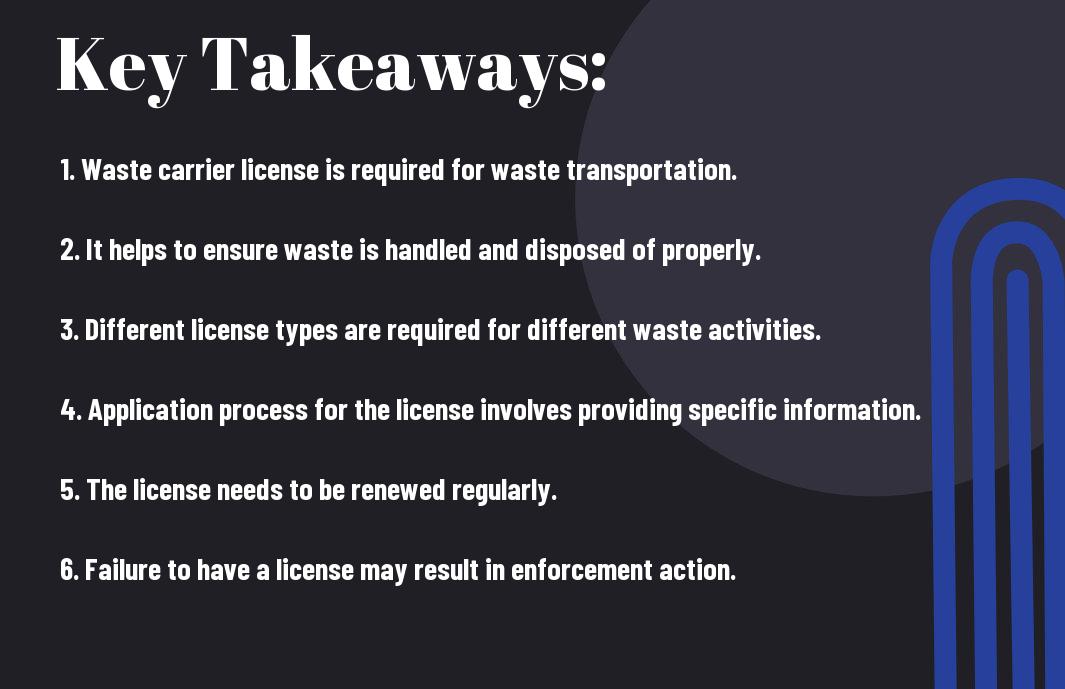
Understanding Waste Carrier Licenses
When it comes to managing and transporting waste, it is crucial to have a good understanding of waste carrier licenses. Whether you are a business owner, a waste management professional, or an individual involved in waste transportation, knowing the ins and outs of waste carrier licenses is essential to ensure legal compliance and environmental responsibility.
Definition and Types of Waste Carrier Licenses
Waste carrier licenses are issued by the Environment Agency in England, the Natural Resources Body for Wales, the Scottish Environment Protection Agency (SEPA), and the Northern Ireland Environment Agency (NIEA). There are two main types of waste carrier licenses – a lower tier license for those who only carry their own waste, and an upper tier license for those who carry waste for other people. Each type of license has specific requirements and obligations that must be met to legally transport waste. This information can be broken down into the following table:
| Lower Tier License | Upper Tier License |
|---|---|
| For carrying only your own waste | For carrying waste for other people |
| Less paperwork and requirements | More comprehensive paperwork and requirements |
| Validity for three years | Validity for three years |
| Cannot transfer the license | Can be transferred |
| Fee charged | Fee charged |
This information is crucial for waste carriers to ensure they have the correct license for their operations. Failure to comply with these requirements can result in heavy penalties, including fines and imprisonment.
Who Needs a Waste Carrier License?
Anyone involved in the transportation of waste, whether as a business or an individual, may need a waste carrier license. This includes those who transport waste as part of their business operations, such as construction companies, waste management firms, and skip hire services. Additionally, individuals who carry waste as part of their job, such as builders, plumbers, and electricians, may also require a waste carrier license.
It is important to note that even if you are not directly involved in the transportation of waste, but arrange for someone else to do so on your behalf, you may still need a waste carrier license. This highlights the broad scope of individuals and businesses that may fall under the requirement for a waste carrier license.
Obtaining a Waste Carrier License
Are you considering becoming a waste carrier or expanding your waste management business? If so, obtaining a waste carrier license is a crucial step in ensuring compliance with the law. A waste carrier license is required for anyone who transports, buys, sells or disposes of waste, and is issued by the relevant environmental agency or authority. For a comprehensive guide on waste carrier licenses, visit Waste Carrier License | What Is It & How To Apply For A ….
Steps to Apply for a License
Obtaining a waste carrier license involves several steps, including completing an application form, paying a fee, and providing proof of your business’s waste management practices. The process typically includes a thorough background check to ensure that the applicant has a legitimate and lawful reason for needing the license. It is important to note that without a waste carrier license, individuals or businesses are not authorised to transport waste, and could face severe penalties for non-compliance.
Once the application is approved, the waste carrier license is typically valid for a specified period, after which it must be renewed to continue operating legally. It is crucial to keep abreast of any changes in waste management legislation and to update your license accordingly to avoid any legal ramifications.
Documentation and Requirements
When applying for a waste carrier license, it is essential to provide comprehensive documentation that demonstrates your waste management practices and adherence to regulations. This may include evidence of suitable waste disposal methods, insurance coverage, and a Waste Transfer Note system to track and monitor waste movements. It is also important to have a designated registered waste manager within your business to ensure compliance with waste management legislation.
Failure to meet the necessary documentation and requirements could result in your application being denied or your existing license being revoked. Therefore, it is imperative to ensure that all documentation is accurate, up to date, and in line with current waste management regulations.
For more detailed information on the specific documentation and requirements needed to obtain a waste carrier license, it is advisable to consult with the relevant environmental agency or authority in your jurisdiction. They will be able to provide guidance and support to ensure that you meet all necessary criteria for obtaining and maintaining your waste carrier license.
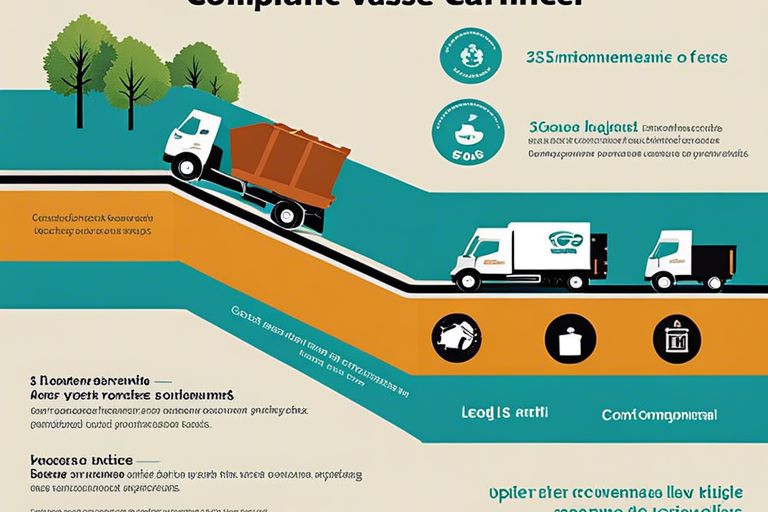
Compliance and Enforcement
When it comes to waste carrier licenses, compliance with the regulations is crucial. The Environment Agency is responsible for enforcing these regulations, and they have the authority to take action against any individual or business found to be non-compliant.
Responsibilities of License Holders
License holders are responsible for ensuring that they and anyone working under their authority comply with the regulations set out in their license. This includes keeping accurate records of waste transfers, maintaining appropriate levels of insurance, and ensuring that waste is only transported to authorised sites.
Consequences of Non-Compliance
Non-compliance with waste carrier regulations can have serious consequences. Penalties for non-compliance can range from heavy fines to imprisonment, and the Environment Agency also has the power to revoke waste carrier licenses. Reputation damage can also be a consequence of non-compliance, potentially impacting future business opportunities.
It is essential for waste carrier license holders to understand the potential consequences of non-compliance and take proactive steps to ensure that they remain compliant with all regulations.
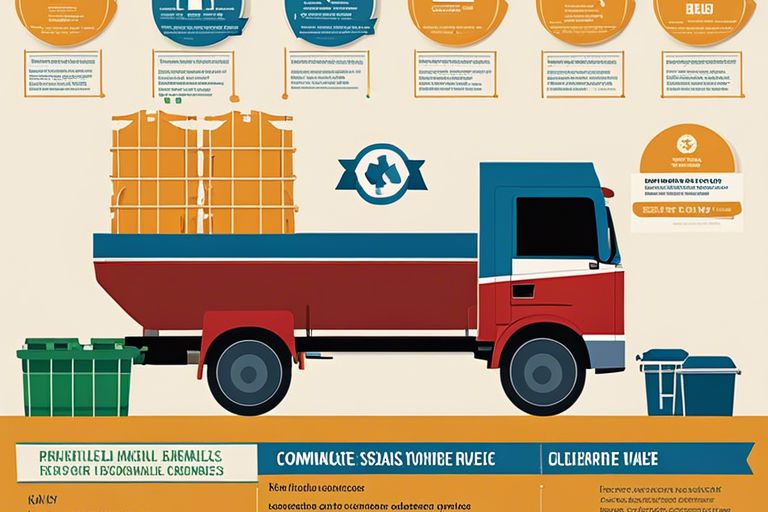
Best Practices in Waste Carriage
When it comes to waste carriage, there are certain best practices that can help ensure the smooth and efficient handling of waste materials. By following these practices, waste carriers can not only fulfil their legal obligations but also contribute to environmental sustainability.
Improving Waste Handling Procedures
Improving waste handling procedures is crucial for waste carriers. This involves implementing effective segregation, storage, and disposal methods to prevent cross-contamination and minimise environmental impact. It also includes investing in proper training and equipment for handling hazardous wastes, such as chemicals or biomedical materials. By continuously improving waste handling procedures, waste carriers can uphold their duty of care and protect the environment from potential harm.
Advantages of Maintaining Good Standing
Maintaining good standing as a waste carrier comes with several advantages. This includes a positive reputation within the industry, which can lead to increased business opportunities and client trust. It also demonstrates compliance with legal requirements, reducing the risk of penalties or fines. Additionally, maintaining good standing can pave the way for potential partnerships with environmentally conscious organisations and contribute to the overall goal of sustainable waste management.
Overall, maintaining good standing is not only a legal obligation but also a strategic advantage for waste carriers. It showcases a commitment to ethical and responsible waste management practices, which can lead to long-term business success and environmental stewardship.
Waste Carrier Licenses – What You Need to Know
Understanding the regulations and requirements for waste carrier licenses is essential for anyone involved in the transportation and disposal of waste. It is not only a legal obligation but also a responsibility towards the protection of the environment and public health. From knowing the different types of waste carrier licenses to the application process, it is crucial to be well-informed and compliant. For a comprehensive understanding of waste carrier licenses and their implications, visit Waste Carrier Licences – It’s Your Responsibility to Know and ensure you are fulfilling your duty as a waste carrier.
Waste Carrier Licenses – What You Need to Know
Q: What is a waste carrier license?
A: A waste carrier license is a legal requirement for any individual or business that transports waste as part of their business activities.
Q: Who needs a waste carrier license?
A: Anyone who carries waste as part of their business, including tradespeople, builders, and waste removal companies, must hold a waste carrier license.
Q: How do I apply for a waste carrier license?
A: To apply for a waste carrier license, you will need to complete an application form and provide details of your business activities, your registered address, and any relevant criminal convictions.
Q: What are the penalties for operating without a waste carrier license?
A: Operating without a waste carrier license is a criminal offence and can result in heavy fines or even imprisonment. It is essential to ensure that you have the necessary license before transporting any waste.
Q: How long does a waste carrier license last?
A: Waste carrier licenses are typically valid for three years, after which they will need to be renewed. It is important to keep your license up to date and comply with any changes in waste management legislation.

